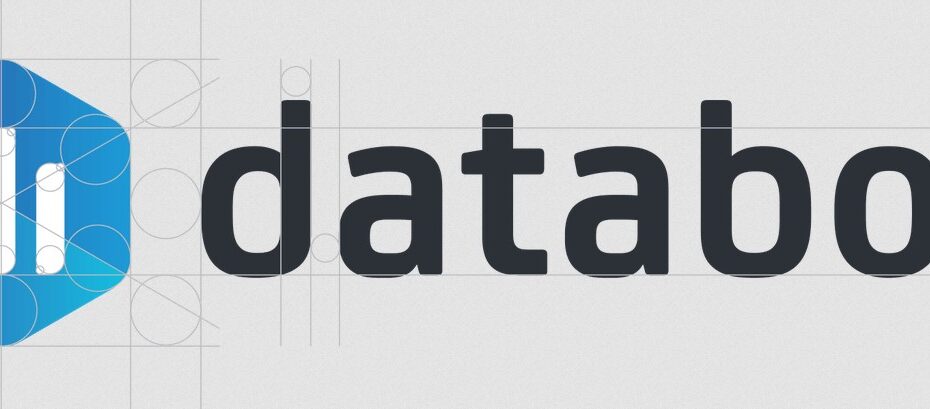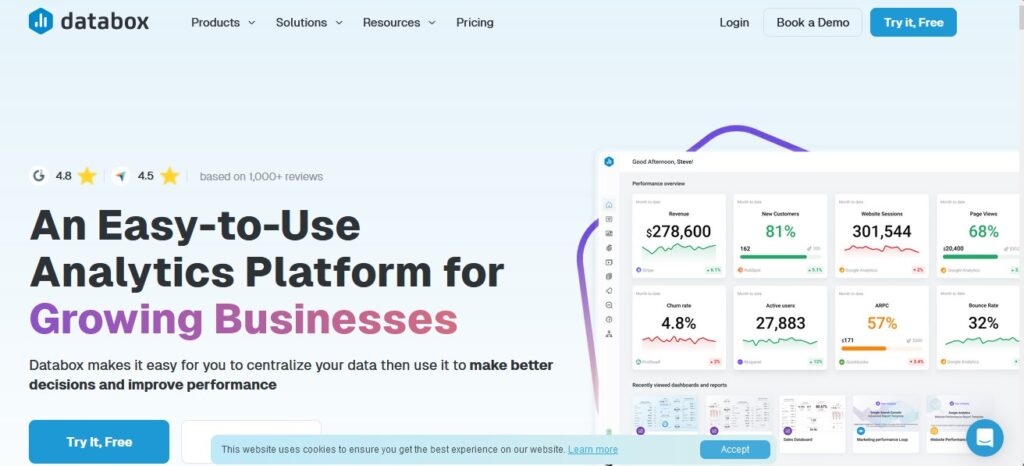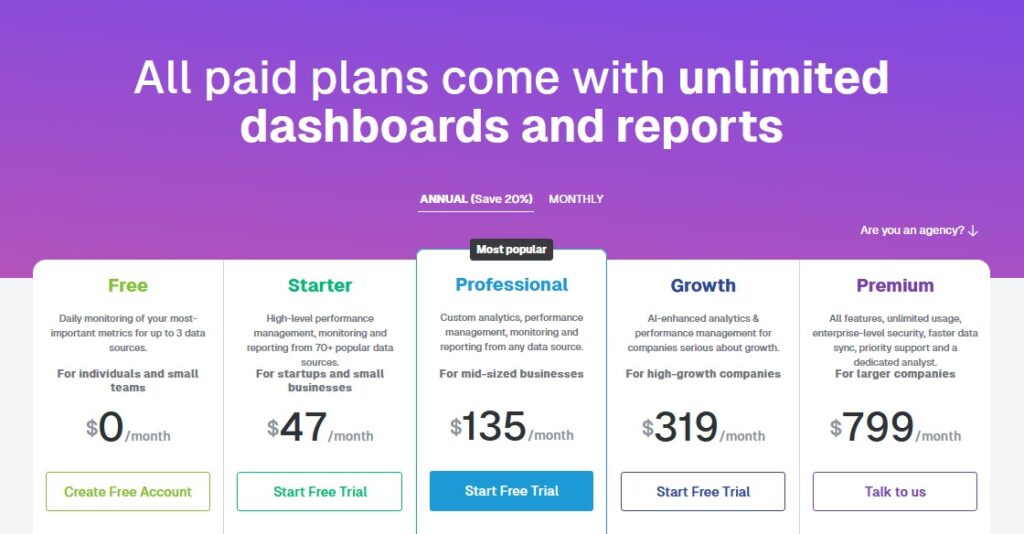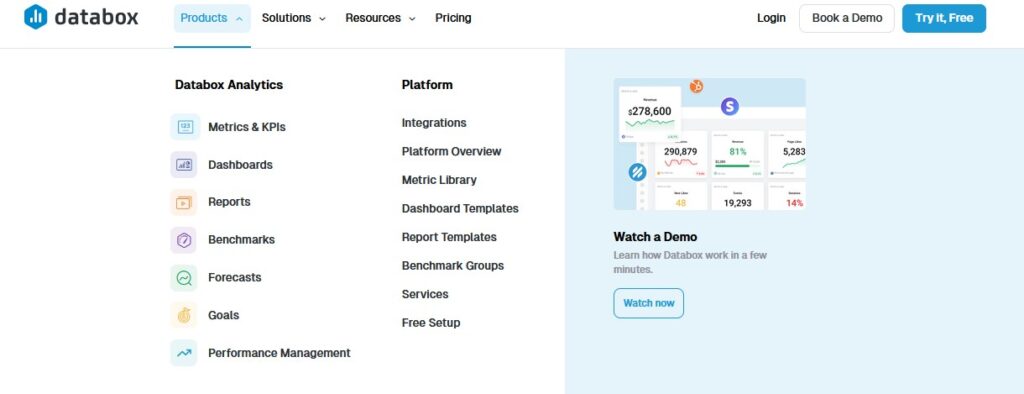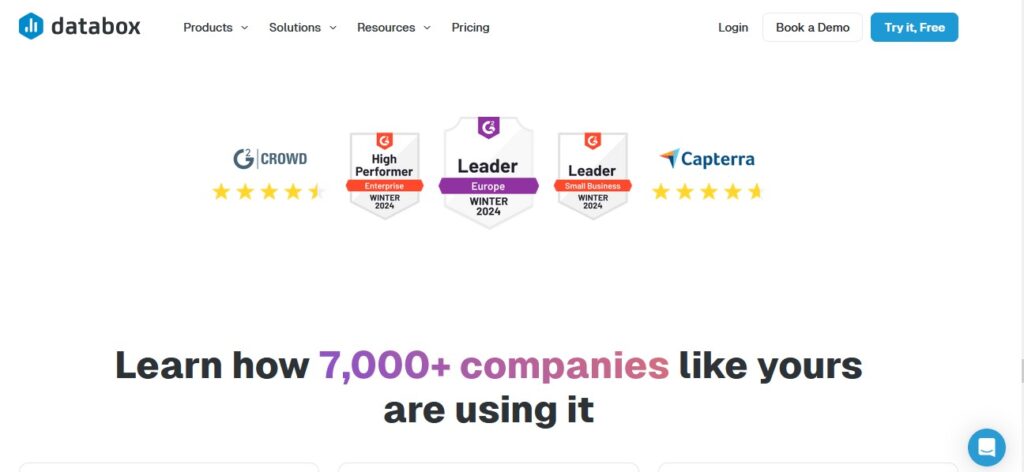When it comes to finding the right CRM platform for your business, Databox stands out as a powerful and versatile option with its competitive pricing, robust features, positive reviews, and viable alternatives. The pricing structure of Databox is designed to accommodate businesses of all sizes, offering various subscription tiers to suit different needs and budgets. This flexibility makes it an attractive option for startups and small businesses looking to optimize their operations without breaking the bank.
In terms of features, Databox offers a comprehensive suite that includes customizable dashboards, data visualization tools, integration with popular CRMs like HubSpot and Salesforce, as well as goal tracking and reporting capabilities. These features empower users to gain valuable insights into their customer data and make informed decisions based on real-time analytics. Additionally, the positive reviews from satisfied customers highlight the platform’s user-friendly interface, responsive customer support, and ability to streamline data management processes.
While Databox is undoubtedly a strong contender in the CRM market, there are also alternative options worth considering such as HubSpot CRM or Zoho CRM. Each alternative has its own unique set of features and pricing structures that cater to different business requirements. Ultimately, carefully assessing the pricing options, feature sets, user feedbacks alongside exploring alternatives would help businesses make an informed decision about choosing the best CRM solution for their specific needs.
Databox Overview
Databox is a powerful data visualization and analytics platform that allows users to easily monitor key performance indicators (KPIs) from various sources in one place. With its user-friendly interface and customizable dashboards, Databox provides businesses with real-time insights into their marketing, sales, and operations data. The platform supports integration with popular tools like Google Analytics, HubSpot, Salesforce, and many others, making it easy to consolidate data from different sources for comprehensive analysis.
One of the key features of Databox is its ability to create custom dashboards tailored to specific business needs. Users can choose from a variety of pre-built templates or build their own dashboards from scratch, allowing them to visualize the most relevant metrics for their organization. Additionally, Databox offers mobile apps that enable users to access their data on the go, ensuring that critical insights are always at their fingertips. Overall, Databox provides businesses with a streamlined solution for tracking and analyzing performance data across multiple channels in real time.
Databox is a powerful tool that provides an overview of key metrics and performance indicators from various sources, including CRM data. As a business owner, I have found Databox to be an indispensable resource for gaining insight into my company’s performance and making informed decisions. The platform allows me to integrate data from our CRM system seamlessly, giving me a comprehensive view of sales activities, customer interactions, and overall business health.
One of the most valuable aspects of Databox is its ability to create customized dashboards that display the specific CRM metrics that matter most to me. I can easily track lead generation, conversion rates, customer acquisition costs, and other crucial CRM data points in real time. This not only saves me time by eliminating the need to manually gather this information from multiple sources but also enables me to quickly identify trends or areas needing attention.
In addition to providing ongoing insights into CRM performance, Databox also offers historical analysis capabilities. By comparing past data with current trends, I am able to see how our CRM efforts have evolved over time and make more strategic decisions moving forward. Overall, Databox has become an integral part of our business operations, empowering us with the knowledge we need to continuously improve our CRM strategies and drive growth.
Databox Pricing: Plans and Costs
Databox offers a range of pricing plans to suit the needs of different businesses. The Basic plan starts at $59 per month and is designed for small businesses and individual marketers. It includes access to basic features such as data connectors, dashboards, and mobile app access.
For larger teams and organizations, Databox also offers a Business plan starting at $248 per month, which includes advanced features such as custom data sources, white-label reporting, and priority support. Additionally, there is an Enterprise plan available for those with more complex needs, with pricing tailored to specific requirements.
Overall, Databox provides flexible pricing options that cater to businesses of all sizes, allowing them to access the data analytics tools they need at a cost-effective rate.
As a small business owner, navigating the world of customer relationship management (CRM) tools and pricing plans can be overwhelming. One such tool that has caught my attention is Databox, with its array of pricing plans and costs tailored to different business needs. The flexibility and scalability of Databox’s pricing model make it an attractive option for businesses looking to invest in a CRM tool without breaking the bank. From the free plan, which offers basic features ideal for startups or small businesses on a budget, to the more comprehensive pro and agency plans designed for larger enterprises, Databox’s range of options ensures that there is something suitable for every stage of business growth.
The transparent pricing structure provided by Databox allows me to easily compare and evaluate the costs associated with each plan, ensuring that I can make an informed decision about which option best suits my business needs. The ability to customize plans based on specific requirements gives me confidence that I am not paying for features I do not need while also knowing that I have access to advanced functionalities as my business expands. As a result, Databox’s approach to pricing aligns with my values as a responsible business owner who wants to invest wisely in tools that will support efficient customer management without unnecessary financial strain. In conclusion, exploring Databox’s pricing plans has offered me valuable insights into how a CRM tool can be both affordable and effective in supporting my business goals.
Databox Features: Key functionalities
Databox is a powerful tool that offers key functionalities designed to enhance the user experience and provide valuable insights. One of its most significant features is the ability to integrate with various CRM systems, allowing users to pull in data from platforms such as Salesforce, HubSpot, and Pipedrive. This integration streamlines the process of accessing customer data and metrics, providing a comprehensive view of sales pipelines, lead generation efforts, and customer interactions. With this feature, users can easily track sales performance, monitor customer engagement, and make informed decisions based on real-time CRM data.
In addition to CRM integration, Databox also offers customizable dashboards that allow users to build personalized views of their data. This feature enables individuals to organize and display specific metrics relevant to their unique business needs. Whether it’s tracking email marketing performance or analyzing social media engagement, the customizable dashboard feature empowers users to focus on the metrics that matter most to them. Furthermore, Databox provides automated reporting capabilities that deliver scheduled updates directly to users’ inboxes or preferred communication channels. This functionality ensures that stakeholders stay informed and up-to-date without having to manually access the platform for routine updates.
Overall, Databox’s key functionalities like CRM integration, customizable dashboards, and automated reporting contribute significantly towards helping businesses harness their data effectively for better decision-making and improved performance tracking.
Databox Reviews: User feedback
Databox has significantly impacted my business operations, and user feedback has played a crucial role in shaping my experience with the platform. As a small business owner, I was in search of a reliable CRM tool that could streamline data management and analytics for our sales team. After reading numerous Databox reviews, I decided to give it a try due to the overwhelmingly positive feedback from other users. The user reviews highlighted its intuitive interface, customizable dashboards, and seamless integration with various data sources as key benefits.
After implementing Databox within our organization, I encouraged team members to provide their input on the platform through regular feedback sessions. Their insights were invaluable in fine-tuning our use of Databox and identifying areas for improvement. Their input not only helped us optimize our dashboards but also led to productive discussions on how we could leverage Databox’s features more effectively. Overall, the user feedback acted as a guide for maximizing the potential of Databox within our CRM strategies, underscoring its value as a powerful tool for driving informed decision-making and operational efficiency within our company.
Databox Alternatives: Competitor options
When it comes to finding alternatives to Databox for CRM (Customer Relationship Management), several competitor options stand out. One such alternative is HubSpot, a robust CRM platform that offers a wide range of features including contact management, email marketing, and sales automation. With its user-friendly interface and powerful analytics tools, HubSpot provides a comprehensive solution for managing customer relationships and driving sales growth. Another prominent competitor is Salesforce, known for its scalability and customization options. Its extensive suite of CRM tools enables businesses to streamline their sales processes, track leads effectively, and gain valuable insights into customer interactions.
In addition to HubSpot and Salesforce, Zoho CRM presents itself as another viable alternative to Databox. This platform offers an array of features designed to help businesses manage their contacts, automate tasks, and analyze data with ease. Zoho CRM’s intuitive interface and affordable pricing make it an attractive option for businesses looking to enhance their customer relationship management capabilities without breaking the bank. Overall, these competitor options provide diverse solutions tailored to different business needs while effectively addressing the challenges associated with managing customer relationships in today’s competitive landscape.
Conclusion
In conclusion, Databox emerges as a powerful tool for businesses seeking to harness the power of data to drive growth and success. With its intuitive interface, robust features, and seamless integrations with various data sources, Databox offers a comprehensive solution for businesses of all sizes. The ability to create customized dashboards and reports empowers users to visualize their KPIs and make informed decisions in real-time.
Furthermore, the positive user reviews highlight the effectiveness and reliability of Databox in delivering valuable insights that help teams stay aligned and achieve their goals. While there are alternatives available in the market, Databox’s combination of advanced functionalities and competitive pricing sets it apart as an indispensable asset for modern businesses. As organizations continue to prioritize data-driven decision-making, Databox remains a key player in transforming raw data into actionable intelligence that drives performance and innovation across industries.
